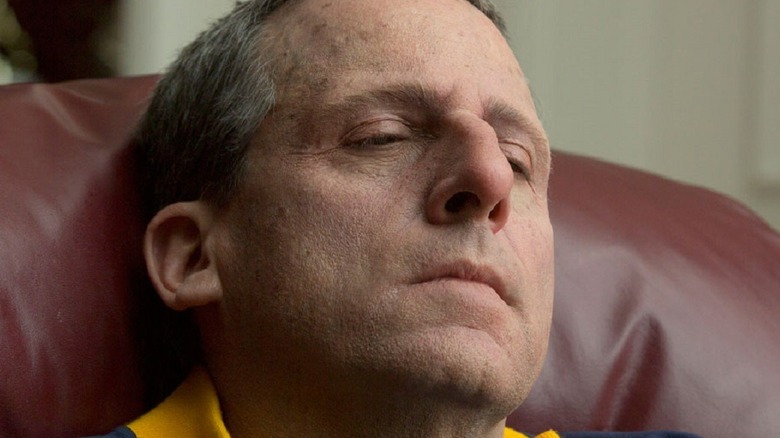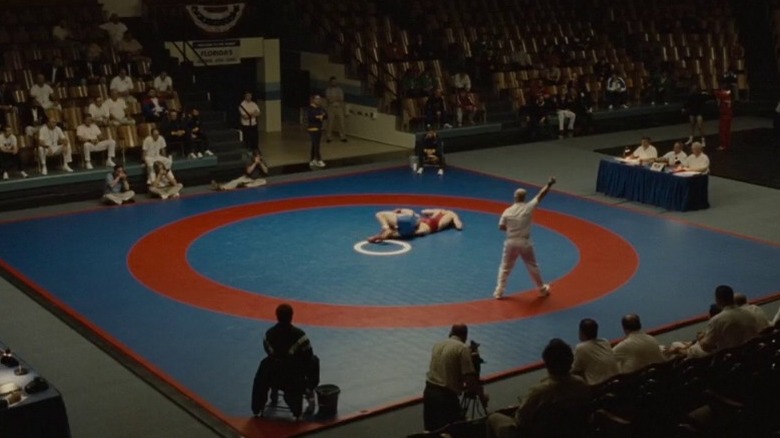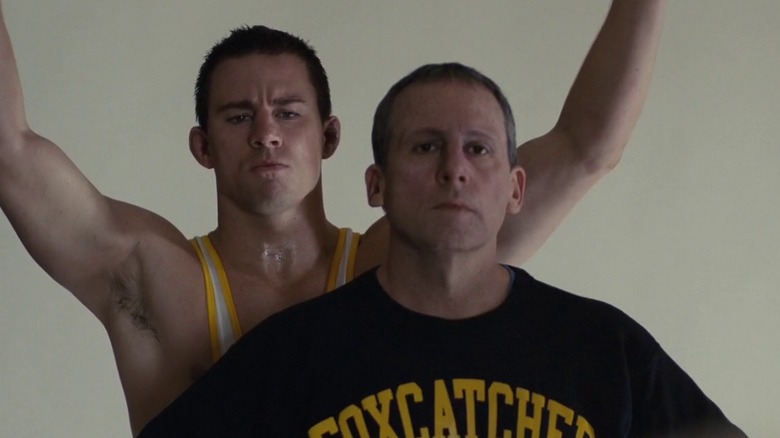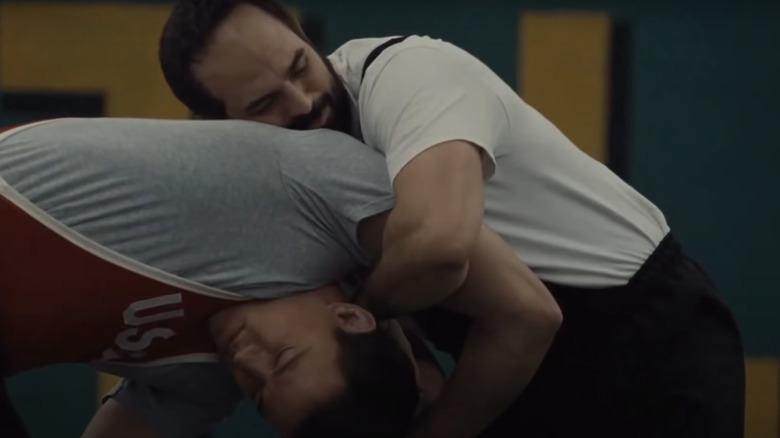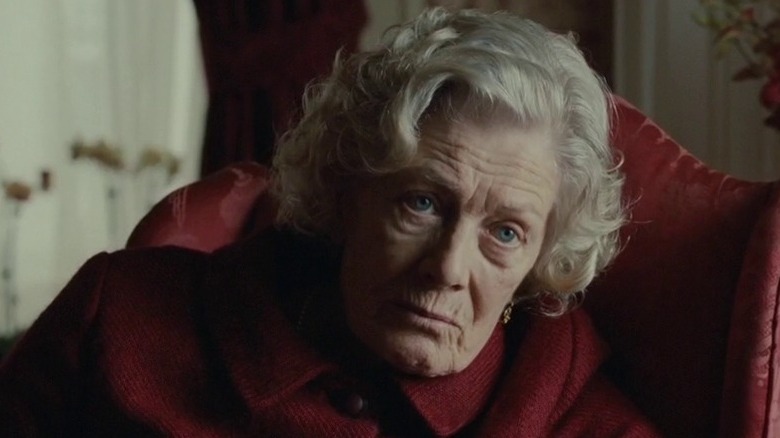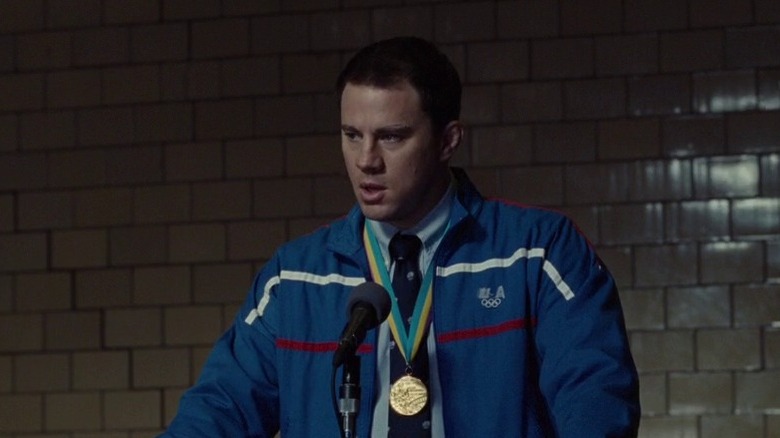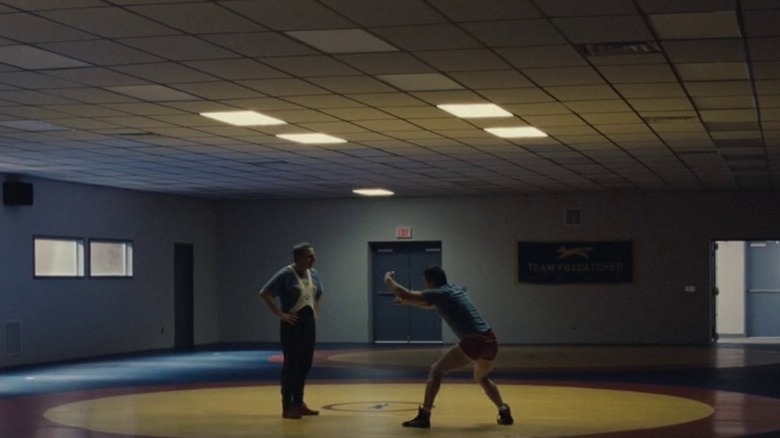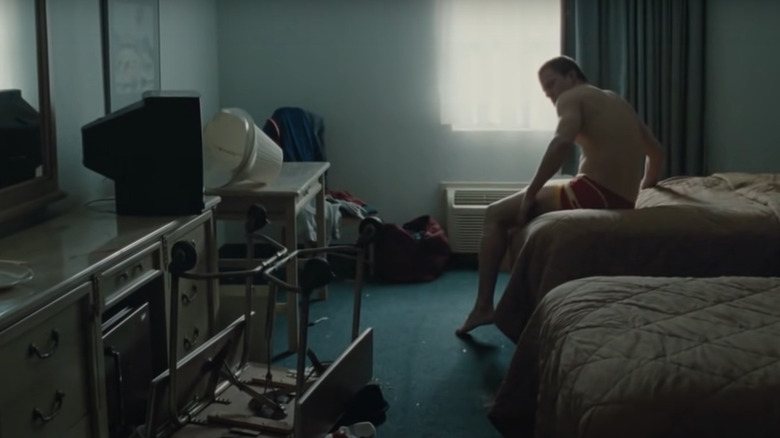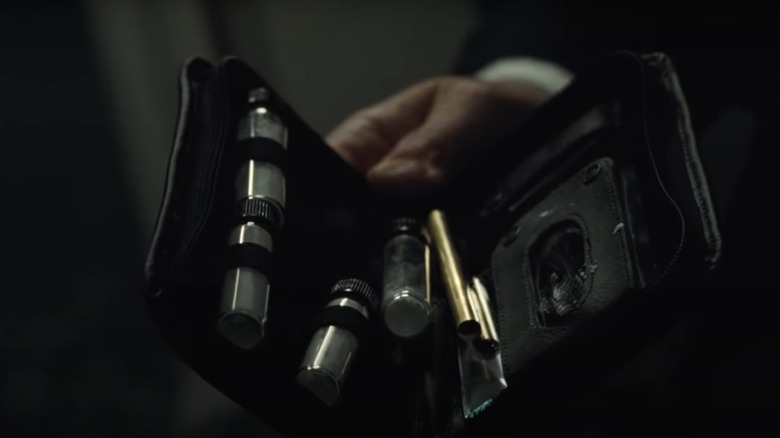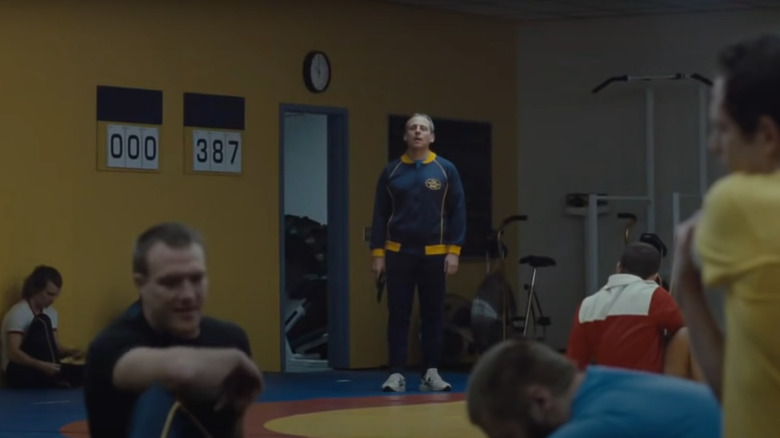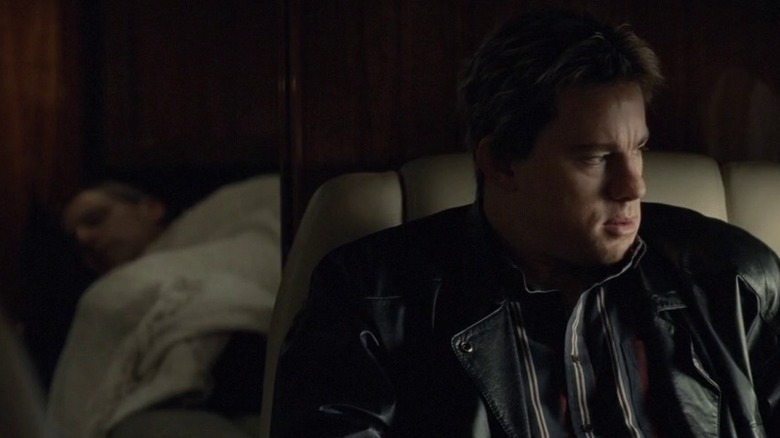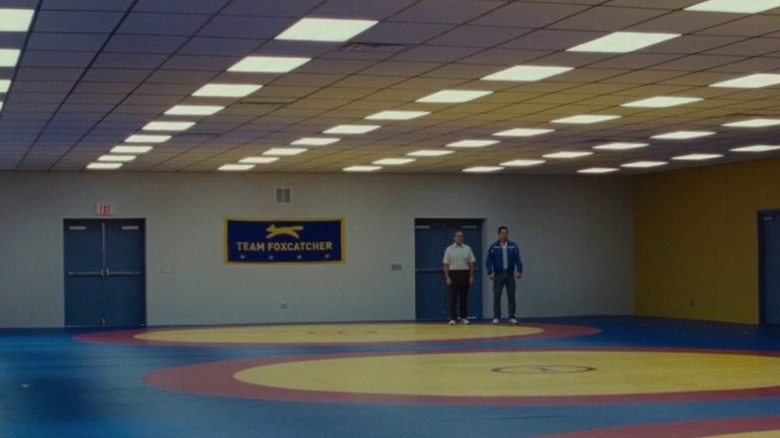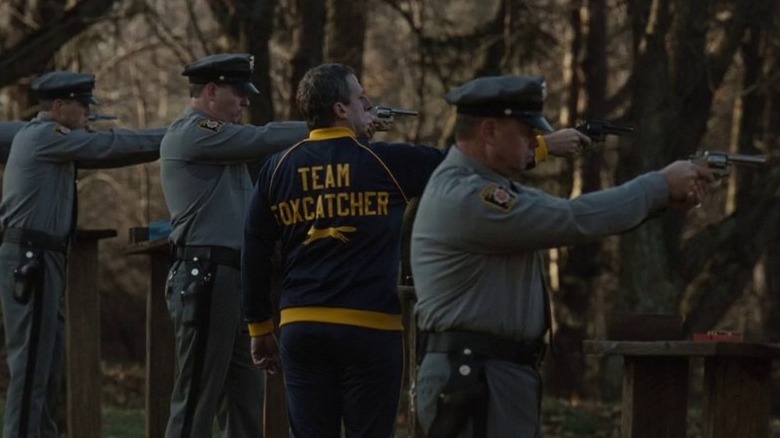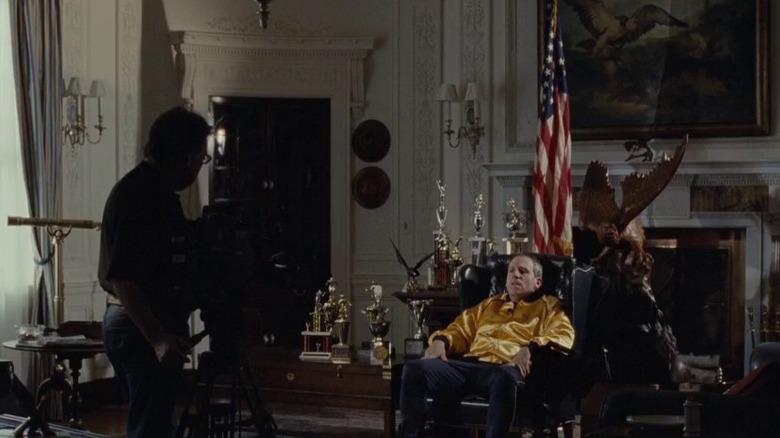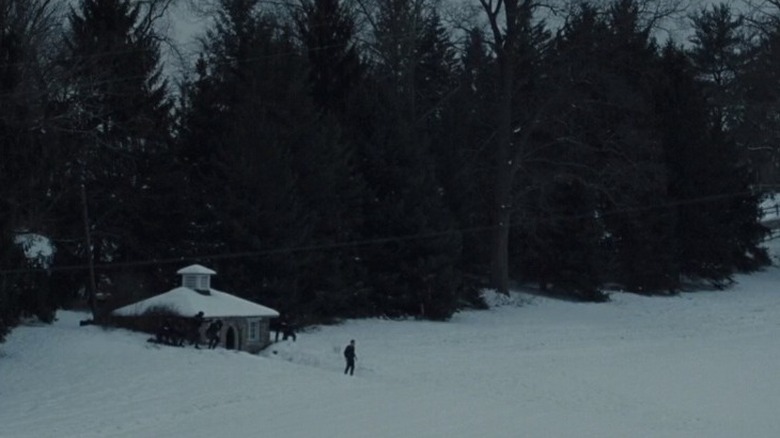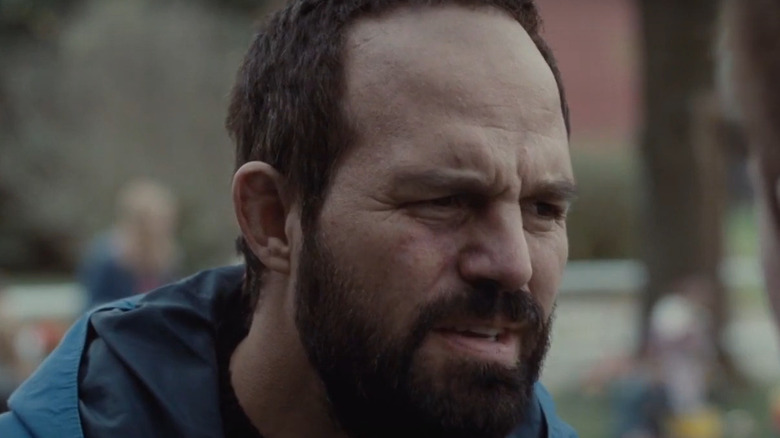Everything Foxcatcher Gets Wrong About The Real Life Story
Olympic wrestling saga turned Greek tragedy "Foxcatcher" weighs in at a heavy 134 minutes and boasts not one, but three marquee stars in its lead roles. The movie, directed by Bennet Miller, follows the switches, reversals, and escapes in the relationship between champion brothers Mark and Dave Schultz and John E. Du Pont. Channing Tatum and Mark Ruffalo star as Mark and Dave respectively and Steve Carrell plays a decidedly unfunny John Du Pont. The movie acted as a particularly interesting showcase for Carrell — best known for comedic roles – since he played largely against type.
For the unfamiliar, John Du Pont, heir to the Du Pont fortune, founded and sponsored a wrestling team on his Foxcatcher estate in the late '80s and '90s. His goal was to field a group of wrestlers who could bring home Olympic gold for the United States. To give his pursuit legs, he brought in Olympic gold medal-winning wrestlers Mark and Dave Schultz to both compete and coach.
However, Du Pont was a paranoid schizophrenic with violent tendencies and a drug problem. On January 26, 1996, Du Pont murdered Dave in cold blood. The film attempts to untangle the relationship between Du Pont and the Schultz brothers and offers an explanation for the slaying. While the directors and the actors shine in their roles, the movie (like many "based on a true story" films) is a fairly far cry away from the truth. Here's a list of everything the film gets wrong about the real-life story.
If you or someone you know needs help with mental health, please contact the Crisis Text Line by texting HOME to 741741, call the National Alliance on Mental Illness helpline at 1-800-950-NAMI (6264), or visit the National Institute of Mental Health website.
The movie doesn't completely explore competitive wrestling in the '80s
Oftentimes when people hear the word wrestler, their mind jumps to Macho Man Randy Savage yelling about the "cream of the crop." However, the house that McMahon built isn't the same as traditional competitive wrestling. It's incredible sports entertainment, but real wrestlers compete in the Olympics, World tournaments, and the NCAA. The greats include names like Jordan Burroughs, Dan Gable, Chael Sonnen, and the Schultz brothers (to name a few).
Unfortunately for folk-style, collegiate, freestyle, and Greco-Roman wrestling fans — there's not a ton of money in one of the world's oldest sports. Miller and screenwriters E. Max Frye and Dan Futterman do a good job of depicting the low point in Mark Schultz's career when the wrestler agreed to participate in the Foxcatcher program. However, the movie never explicitly explains how bootstrapped many wrestlers were in the 1980s, nor does it do justice to depicting just how heinously athletic Mark Schultz was.
Amateur wrestlers in America weren't paid to train and sponsorships in the 1980s were limited. At the same time, Olympic competitors were often given dedicated resources to allow them to dedicate as much of their waking life as possible to their sport of choice. In order for Schultz to take gold in the 1984 Olympics, he had to go above and beyond the athletic call of duty.
"Mark was one of the strongest wrestlers on earth and had amazing athletic abilities," said wrestler Gary Abbot in a review of the movie posted to Team USA Wrestling. "If anything, the movie did not let you know how excellent a wrestler Mark really was." He goes on to say even though the wrestling looks fantastic, he doesn't know if any movie could've found a way to represent Mark's unique talent.
Mark didn't admire Du Pont
In the film, when Schultz first meets Du Pont and begins working for him, Miller and co. depict Schultz as admiring Du Pont. However, in real life, there was no such pedestal. In his memoir, "Foxcatcher: The True Story of My Brother's Murder, John Du Pont's Madness, and the Quest for Olympic Gold," Schultz make it abundantly clear he didn't like or respect Du Pont.
In fact, Schultz writes from the moment he met Du Pont, he remembers "staring at a loser" (via Slate). Schultz even goes on to detail Du Pont's repellant appearance saying he remembers, that Du Pont's teeth were "dark yellow and caked with food."
The relationship between Carrell's Du Pont and Tatum's Schultz adds to the movie's central thesis — that even Olympic-level warriors aren't immune to the whims of the heinously wealthy in America — but clearly doesn't reflect reality. Little moments like Tatum's Schultz being impressed with the size of Du Pont's house add nice touches to make Bennett's point. However, the real Schultz wanted to keep Du Pont at arm's length.
The movie doesn't show the real life sibling rivalry
The movie "Foxcatcher" dedicates a sizable amount of its runtime to the sibling rivalry between Mark and Dave Schultz. However, Miller's storytelling largely reveals exposition in action or vignettes from different episodes of the Schultz brothers' lives. For example, a three-minute scene in which the Schultz brothers spar works as a short film for their entire onscreen relationship. Miller leverages the ebbs and flows of actual wrestling moves to reveal character traits in each brother.
Again, this is all fantastic filmmaking but it largely implies and dramatizes the realities of the brothers' relationship. In reality, the brothers' rivalry at the outset of the film revolved around the fact that Mark had been laid off from a coaching job at Stanford, and his brother Dave was kept on as coach. In his book, Mark said that event "cut a chord" between the brothers (via Slate). He goes on to say he eventually came to terms with his own role in their strained relationship and said a lot of it came down to his own ego.
In the end, the two overcame their differences and continued training together. In reality, they were never actually at Foxcatcher farms at the same time. They went so far as to work out a deal with Du Pont where both brothers were paid if either one of them wrestled for Foxcatcher.
Du Pont's backstory is largely left out of the film
Du Pont — for obvious reasons — emerges as the villain of the film. While Carrell wanted to play Du Pont entirely in character, with verbal tics and odd physicality, the movie omitted a ton of details from Du Pont's formative years. Following the murder of Dave Schultz, the New York Times ran an in-depth feature on John Du Pont. They described him as "an achingly lonely child in a fatherless household who used his inherited fortune to buy what he did not have naturally: camaraderie, adoration, self-worth."
Carrell's acting implies Du Pont's creeping isolation and lack of self-worth on screen. However, director Bennet Miller keeps the movie's timeline rooted in Du Pont's time with Foxcatcher. The script signals how rotten Du Pont's childhood was by wielding his mother Jean Du Pont — played to scaly effect by Vanessa Redgrave — like a weapon. Every time she appears she cuts through her son's delusions instantly. It creates tension for the audience but it never explicitly reveals just how bad Du Pont's child and inner turmoil really was.
Mark was the coach of Villanova wrestling
One plot point the film entirely erases is Mark's tenure at Villanova. In real life, Du Pont planned to earn wrestling credibility by bankrolling the Villanova wrestling team in Pennsylvania. The mainline college was competitive in the sport, but not necessarily well funded. John Du Pont arranged for Mark to take over as the school's coach under his management after Mark's brother Dave turned the job down.
In his book (via Slate), Mark recalls the Villanova arrangement he struck with Du Pont. He said Du Pont agreed to limit his role on the team and operate as a figurehead more than a hands-on coach. However, within a few weeks, Du Pont was around all the time. Mark felt his presence was comical at best due to Du Pont's lack of wrestling knowledge — and both uncomfortable and inappropriate as he often appeared "drunk or on drugs, or both." Allegedly Du Pont also made unwanted advances on some of the wrestlers in the program. In the end, the program lasted about two years. Then Mark moved on to The Foxcatcher estate to begin training for the Olympics.
While this chapter of the story was likely cut from the film for time, events like this present Du Pont's later actions as the end of a long march to madness. Instead, his onscreen actions appear to be a manic instant reaction to a situation he couldn't stand.
There was no physical relationship between Mark and Du Pont
The movie "Foxcatcher" creates a ton of artificial road signs to imply John Du Pont murdered Dave in order to bring Mark back into the fold. This narrative is dramatically compelling, but it has no stake in reality. Most survivors maintain the crime had no discernible motive and Du Pont himself insisted he carried out the crime because he was mentally unwell (via People).
To create a sort of obsession between Mark and John in the movie, director Bennett Miller implies the two engaged in a sexual affair. After seeing the final film, Mark responded on Twitter saying (via The Guardian): "Leaving the audience with a feeling that somehow there could have been a sexual relationship between DuPont and I is a sickening and insulting lie."
Clearly, the younger Schultz brother took offense to the untruthful portrayal. A feature on "Foxcatcher" in Vulture laid out Miller's obsessive research around the subject and his interest in the story as a tragedy, but Schultz maintained the dramatic licensing had been taken too far.
While it's difficult to know exactly why some fictional moments are injected into real-life stories — especially one as tragic as the events surrounding the Foxcatcher wrestling team — it's safe to assume the implied relationship between Mark and John was meant to serve Miller's vision for the movie alone.
Mark's best friend is omitted from the film
Wrestler Hal Miles is completely omitted from the story told in "Foxcatcher." Miles and Mark met in 1987 when Miles was coaching at Virginia State University and Mark was looking for a facility to hold a training camp for rising wrestlers. While 1987 falls well into the timeline "Foxcatcher" covers, Hal told The Progress-Index that the producers left him out of the film in order to focus on the relationship between the Schultz brothers.
For the most part, this doesn't alter history in any way particularly relevant to the general public. However, it does change one of the film's biggest scenes. After Mark loses his first match during the 1988 Olympic Trials in Pensacola, Florida he returns to his room, has a breakdown — Channing really did break that mirror with his head for the scene — and binge eats. He eats so much that he winds up 12 pounds overweight before his next match. In the movie, Dave finds the wreckage of his hotel room, gives him some kind words and coaches Mark to lose 12 pounds in 90 minutes.
Every part of that story is true except that Dave didn't come to Mark's rescue, Miles did. Later Dave joined to help his brother workout to shed the weight, but it was Hal Miles who gave the speech that saved his friend's shot at an Olympic appearance.
If you are struggling with an eating disorder, or know someone who is, help is available. Visit the National Eating Disorders Association website or contact NEDA's Live Helpline at 1-800-931-2237. You can also receive 24/7 Crisis Support via text (send NEDA to 741-741).
Du Pont didn't introduce Mark to drugs
John Du Pont introduces Mark Schultz to drugs in the movie. However, this is another bit of fiction designed to create dramatic tension between Mark and John Du Pont. In his memoir, Schultz admits to having used cocaine before he met Du Pont (via Slate). He then goes on to say he only ever used the drug with Du Pont a handful of times.
Du Pont, on the other hand, had a history of drug abuse and alcoholism. After his death, various associates revealed to the press that Du Pont frequently abused liquor and hard substances. He even drove a car into the pond on one occasion (via Time). All of this would have been out in the open to the Foxcatcher staff and its wrestlers. Mark went so far as to note in his memoir that Du Pont appeared drunk and high when they first met (via Time) — but the movie seems to downplay this aspect of Du Pont's life. While Du Pont appears drinking on screen his stupors and subsequent rages are omitted from the plot.
If you or anyone you know is struggling with addiction issues, help is available. Visit the Substance Abuse and Mental Health Services Administration website or contact SAMHSA's National Helpline at 1-800-662-HELP (4357).
Du Pont didn't bring a gun to practice
One of the tensest moments in "Foxcatcher" — in a movie full of them — unfolds when du Pont walks into a wrestling practice with a loaded handgun. He gets the team's attention, tells them how many days are left until their next major competition, and fires the gun into the ceiling to commence practice.
This scene shows behavior that is unacceptable for a coach or any sort of law-abiding individual. It's also likely untrue. Schultz makes no mention of the incident in his memoir, however, he does mention a violent incident that's left out of the movie entirely (via Time).
In his memoir, Schultz describes an incident when Du Pont broke into his apartment — apparently a very typical occurrence — and threatened Mark's then-girlfriend at gunpoint. At the time Schultz recalls thinking Du Pont was more unwell than dangerous. Miller and his screenwriters likely left this incident out of their film to ensure the film remained focused on Dave, Mark, and John. However, the movie does depict the odd hours where Du Pont would materialize around Mark's cabin, mostly unannounced.
If you or someone you know is dealing with domestic abuse, you can call the National Domestic Violence Hotline at 1−800−799−7233. You can also find more information, resources, and support at their website.
Mark and Du Pont's falling out had nothing to do with Dave
One of the tragic dominoes "Foxcatcher" sets up to knock down is the divide between Mark and Dave. The men had their rivalry, but Dave's hiring as a coach was not the reason Mark eventually quit the team. It all wasn't Mark's jealousy of John's approval of Mark. And it certainly had nothing to do with a wrinkle in Mark and John's fabricated attraction.
In his book, Schultz points out that Dave and Mark never lived and trained at Foxcatcher at the same time. In fact, Dave wasn't brought on to coach until after Mark had been fired. Mark claims he was never given an official reason for his firing. However, he does say it came after a seemingly small argument with Du Pont (via Slate).
Departures from reality like this serve the film's message. Miller lingers on American flags and various symbols of class (like the various horse racing trophies and familial portraits) throughout the film. By positioning the sibling's rivalry against the creep of classism and obscene wealth, the movie makes the rivalry something of a tragic flaw between the two wrestlers. In the end, they are too blinded by their personal relationship to realize that their relationship with their benefactor (and his money) may be their undoing. Given the movie's abundance of similarities with classic Greek tragedies, it's no surprise that the story is restructured to reflect this tragic point.
The movie's timeline is inaccurate
The movie's linear structure makes the story of Team Foxcatcher appear both straightforward and relatively contained to a couple of years. However, in reality, the relationship between the Schultz brothers and Du Pont lasted almost a decade and involved multiple teams and various institutions. For example, as previously mentioned, Mark's run as a wrestling coach on Du Pont's wrestling team began in 1986 and lasted about two years (via The New York Times).
Dave came to Team Foxcatcher in 1989 — a few months after Mark had left the institution in his rearview. The New York Times reports that the same year Mark left the compound, Dave arrived with his wife and two children. Du Pont had recruited him as a coach. Dave then proceeded to train and attempt to qualify for both the 1992 Summer Olympic Games and the '96 Games. He received a paid stipend to train and his family did live on the farm as depicted. However, unlike in the movie, Dave's murder occurred in 1996, not shortly after Mark's departure.
Miller and company likely shortened the timeline to serve the story. If there were more than a half-decade distance between Mark's departure and Dave's murder on screen the film wouldn't have had the same narrative tissue. With so much time between the events keeping true to the actual story might've meant a different movie entirely.
The movie omits Du Pont's history of poor behavior
Carrell depicts Du Pont as a very obviously dangerous person. However, in real life, Du Pont reportedly acted out more than his on-screen counterpart. Reports about Du Pont — both as a result of Dave's murder and the release of the film itself — told story after story of dangerous and odd behavior.
For example, Time explains another Foxcatcher Coach, Dan Chaid, quit the team after Du Pont threatened him with a machine gun. Dave and Mark's father, Phil Schultz, told The New York Times he witnessed Du Pont having a breakdown when seeing his son on the Foxcatcher estate for Thanksgiving.
A feature on Du Pont in The New York Times from 1996 explains his first marriage ended after only a few months because Du Pont attacked his new bride multiple times in drunken rages. The piece goes on to explain in the months leading up to the murder, people on the estate recall Du Pont carrying a gun for protection (within the confines of his 800-acre estate) and paying workers to X-ray his walls for tunneling invaders.
Many more incidents and accusations came out during John's criminal trial. An in-depth look into the crime in VICE printed when the movie was released claims the murder was the "paranoid climax" of a long-running psychosis. It's hard to say why Miller and his team omitted so many of John's apparent episodes of mental imbalance from the film. However, it seems safe to say Carrell's engaging performance is subtle compared to the real-life Du Pont.
If you or someone you know needs help with mental health, please contact the Crisis Text Line by texting HOME to 741741, call the National Alliance on Mental Illness helpline at 1-800-950-NAMI (6264), or visit the National Institute of Mental Health website.
The movie gives a motivation to a crime without one
In his memoir (via Slate), Mark claims to have no real understanding of the motive behind Du Pont's criminal act. While the movie implies an unhinged Du Pont murdered Dave to bring Mark back into the fold, Mark hadn't been near the farm for more than a half-decade before Dave's murder. However, Schultz does suggest Du Pont might've killed Dave to clear up the coaching position for his new favorite wrestler, Valentin Jordanov. Jordanov's birthday was the day of the murder.
While the movie fictionalizes motive, it still accurately depicts the murder. Dave's shooting occurred in real life as it does on screen. Dave's surviving wife Nancy Schultz — played by Sienna Miller in the movie — told USA Today she was on sent working with Ruffalo and Miller when they filmed the tragedy. Nancy says the film almost "exactly" captures what happened on the day in question.
If you or someone you know is dealing with domestic abuse, you can call the National Domestic Violence Hotline at 1−800−799−7233. You can also find more information, resources, and support at their website.
The film doesn't portray Du Pont's showdown with police
The film "Foxcatcher" quickly gets to the end of its runtime following John's heinous act. However, by expediting events the movie omits one of the craziest elements of the already stranger than fiction story.
In real life, Du Pont held himself up in a panic room in his massive estate in a standoff with Pennsylvania law enforcement that lasted 48 hours. As depicted on screen, Du Pont really did have a cache of weapons and the situation was highly volatile. The New York Times reported hostage negotiators devised a plan to draw Du Pont out by cutting the heat to his home. Du Pont then reportedly decided to attempt to fix the issue himself and was apprehended during repairs. It was a massive operation, the LA Times reported that 75 officers surrounded the estate during the process, and SWAT was brought in to apprehend the millionaire.
On-screen, Du Pont's apprehension was depicted — he was even arrested in a Team Foxcatcher jacket in real life — however, the movie makes no mention of a standoff or panic room.
The movie doesn't quite explain Dave's impact on wrestling
While Ruffalo's tragic performance emphasizes Dave Schultz's good nature, charisma, and wrestling skill, the movie doesn't quite explain how much Dave meant to the sport of wrestling at the time.
World Champion wrestler Kurt Angle told the Washington Post that Dave was the "the godfather of wrestling," in Dave's obituary. In his wrestling career, Dave won an Olympic Gold, was the 1983 World Champion, became a three-time World Cup champion, and achieved a whole lot more. Beyond his career achievements, Dave's peers also lauded his work ethic, caring demeanor, and commitment to spreading his knowledge and helping train others in the sport.
Mark's friend and wrestler Hal Miles told The Progress-Index that Dave was a renowned "technician" on the mat and internationally admired for his commitment to passing on "his skills to other wrestlers." He was a truly larger-than-life figure in a sport that almost never gets the attention its competitors' efforts should warrant.
Today, his surviving wife Nancy keeps his memory alive by overseeing a foundation that supports many of Foxcatcher's ex-team members. At Dave's memorial service, the then president of USA Wrestling described Dave as the "man with 10,000 friends" (via The Guardian). For a small portion of the world's best athletes, Dave was a powerful figure who earned his way to the top through hard work, kind words, and grit on the mat. That his life was cut short by the antics of the uber-privileged is exactly the tragic point "Foxcatcher" drives at. Rest in peace, Dave.
